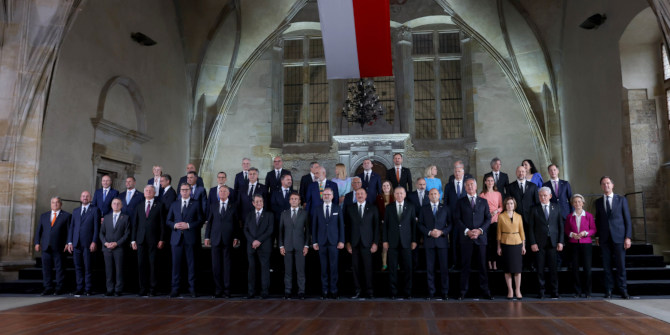On 26 May, Switzerland pulled out of negotiations over a new partnership with the European Union. Clive H. Church writes the country is now facing both a crisis in its relations with the EU and a democratic crisis over how the decision was made.
The 26 May decision by the Swiss government not to proceed with an Institutional Framework Agreement (IFA) with the EU has been seen by academics as simply a matter between two administrations which might lead to accommodation or to ‘disintegration by default’. It has also been seized on by anti-Europeans as a glorious snub to the bullying EU and a vindication of self-determination and direct democracy, as well as a harbinger of a possible break-up of the EU.
Rather less has been said about how and why the rejection came about and what form the rejection actually took. It came after a period of growing domestic tension and was announced in a very unusual way. Moreover, it was motivated by political concerns as well as by concrete issues. And changes in domestic politics are also likely to affect the way that relations with the EU evolve in future. In fact, the rejection seems to have opened new and critical phases not only in relations with the EU but in domestic politics as well.
The demise of the Institutional Framework Agreement
Where EU relations are concerned, things are likely to be more complex and less dramatic than anti-Europeans might wish. This is because Switzerland is still wanting to move in a very different direction from that endorsed by Brexiteers. Thus, the rejection was coupled with a commitment to pursuing closer relations with the EU. In other words, despite rejecting the IFA, the Swiss want to carry on with the very particular relationship known to them, not very helpfully, as ‘bilateralism’ which came into being in the early 2000s.
However, while the bilateral approach has become increasingly popular in Switzerland, where it is viewed as a staple of political culture, the EU has found the relationship problematic. It has been viewed as too static, too uncertain judicially and increasingly difficult to manage. So, talks about some form of coordination began in 2014. These resulted in an apparently agreed text in November 2018.
This was circulated without comment for consultation by the Federal Council. It was not well received domestically with trade unions, unusually, denouncing it. Attitudes to Brussels hardened even though the Swiss electorate emphatically rejected an initiative by the Swiss People’s Party (SVP) to put limits on free movement.
Swiss public opinion became increasingly preoccupied with the issue of sovereignty, with business pressure groups emerging to fight the IFA. A new Swiss negotiating team was put in place for January 2021, but this too failed to deliver, even after a list of demands was given to the EU. As tensions mounted, there was talk of the IFA being dead. A ‘last ditch’ summit between SVP Minister Guy Parmelin and Ursula von der Leyen on 23 April seems to have made things worse as the tone of subsequent exchanges deteriorated.
Then, without further consultation, and ignoring parliamentary calls to continue talking, the government in a very un-Swiss way announced on 26 May that it would not be signing the agreement. Its reasoning was that there were essential differences between the sides in three key areas and unless these were remedied there was no hope of getting the deal past a referendum. It seems that fears about defeat were almost as important as the actual problems with the three areas, all of which reflected on Swiss identity.
The three areas were state aid rules, which threaten cantonal autonomy, wage protection to prevent social dumping, and the effects of the likely application of the 2004 Citizenship Directive under the IFA which could threaten social welfare budgets. But the government also hinted that the text itself was an imposition by the EU and not something jointly agreed. This all suggests a changing attitude to integration. Nonetheless, it coupled all this with a commitment to ongoing cooperation and Europeanisation.
Reactions in Switzerland and the EU
The rejection came as a real shock to most Swiss. Coming out of the blue and without reference to parliament, it seemed unusually abrupt and decisive, throwing away years of hard work without providing any clear view of the future. Yet it created a new diplomatic situation, much to the liking of Christoph Blocher and other Eurosceptics within the country.
The EU in contrast took it relatively calmly, regretting the decision and pointing out the effects that rejection would have. As such, the May crisis was highly significant, albeit not on the scale of 1992, when the Swiss electorate rejected membership of the European Economic Area. It has blocked off what was the main road ahead without really offering any assured alternative, opening the way to a period of uneasy and uncertain standoff. However, very little will change immediately since the Swiss were rejecting future structures rather than the status quo. Moreover, both sides now expect the other to make the first move.
The drama of 26 May has also affected domestic politics. Indeed, some have called it a ‘democratic crisis’ because of the way the government ignored other opinions. There has been a sense that the country has inched towards populism, a trend reinforced by the 13 June defeat of a new CO2 bill, which was a carefully and painfully crafted compromise designed to help Switzerland meet its obligations under the Paris Agreement on climate change. The standoff with the EU also poses challenges for pro-European forces. Switzerland may well be in for a long and critical period of political sparring and possibly of re-alignment.
This is partly because both the country’s government and the main political parties continue to ignore the essential message from the EU. The EU has made it clear that the status quo is no longer available and, having rejected the IFA, all that the Swiss can now look forward to is the gradual deterioration of their relationship as present accords wither and die without being replaced. Despite this warning, Swiss thinking remains fixed on bilateralism.
Debate in the emergency parliamentary session on the rejection oscillated between seeking to apportion blame for the rejection and canvassing a range of possible options in a way not done for some thirty years. Some of these were compatible with a future of reduced circumstances, such as linking up with other third states and reforming the domestic economy or the unpopular ideas of seeking EEA or EU membership. Each party has its own scheme, just as the government does. However, the latter also seems to be assuming that the status quo can be reinforced or repaired by talking to EU leaders and copying new developments.
Next steps
What proposals are ultimately put to Brussels will depend on the balance of forces in Switzerland. By rejecting the IFA, the government seems to have edged towards the conservative position and seems to have the backing of the SVP and probably that of much of the Radicals as well. This suggests a populist refusal to admit that bilateralism is on the way out. And an opinion poll suggests just over half the population approved of the government and what it has done.
At the same time the rejection has presented pro-European parties with new challenges. Presently they are very divided and as the recent debate showed, espouse different solutions to the question of how to relate to the EU. The Social Democrats are open to raising the question of joining the EU, the Green Liberals want Switzerland to join the EEA, and the Greens to seek some other form of rapprochement. The Radicals would like to keep bilateralism but are also open to new partnerships beyond the EU and want an economic liberalisation package to help offset the costs of not having the IFA. However, like the Centre party, they are split over the issue and their position has been weakened by the sudden resignation of their party President.
The wider pro-European movement is also likely to be re-energised by the crisis and will have its own ideas. An initiative on closer relations is likely but this can only be a long-term affair. And, though such an initiative could prove polarising, bodies like the pro-EU Libero have the skills to campaign as effectively as the SVP. Indeed, direct democracy seems to offer them more than it does the SVP. Equally, they have the possibility of taking the government to court for exceeding its powers by making a major change in foreign policy without involving the country’s parliament.
Exactly how all this will work out is hard to say but Switzerland is likely to follow a locally focused line, unattractive to other anti-European movements. The Swiss wish to stay close but without paying an institutional price and have yet to accept that this may not be possible. So, the crises are likely to last a while.
Note: This article gives the views of the author, not the position of EUROPP – European Politics and Policy or the London School of Economics. Featured image credit: Andrzej Biały on Unsplash






Bilaterals were a good short-term solution but they are not a long-term solution. One of the best arguments against them is that Switzerland is ‘cherry picking’. Bilateral agreements have a time limit and the EU will not renew them as of 29 May 2021. Switzerland (and the EU) will be forced to come up with a solution to resolve this problem.